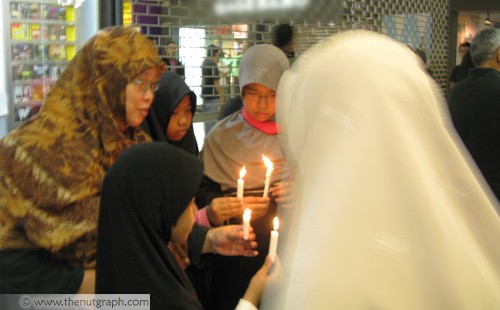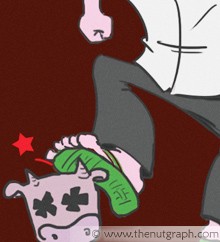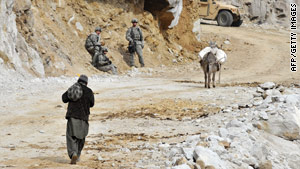Shape of a Pocket by Jacqueline Ann Surin | The Nut Graph,
“SATU lagi projek Barisan Nasional”. That’s the tagline that often graces billboards announcing projects that the BN government has funded. It’s a tagline often used during elections to help the ruling coalition convince voters of its commitment towards development.
But after yet another unnecessary
police crackdown on peaceful demonstrators protesting 50 years of the Internal Security Act (
ISA) on the night of 1 Aug 2010, one can’t help but be cynical, like others, about the
tagline. The way the police acted, it was as if wearing red, the colour of the anti-ISA protest, was a crime. Holding a
candle was also a crime. Chanting “Mansuh, mansuh. Mansuh ISA” was clearly a no-go. Waiting outside a police station to ensure that the arrested were eventually released deserved the threat of being water canoned and arrested.

Anti-ISA demonstrators in Petaling Jaya on 1 Aug 2010
Indeed, satu lagi projek BN. After all, the
police are not acting independently of the Umno-led BN government. Indeed, the home minister, whom the police are answerable to, is no less than Umno vice-president Datuk Seri
Hishammuddin Hussein. Still, repeated police abuse of power, partisanship and incompetence isn’t the BN’s only project worth noting.
Other BN projects
The BN, in particular Umno, has other projects it seems only too proud to initiate and perpetuate.
 Banning ideas, views, even research
Banning books
Banning ideas, views, even research
Banning books and ideas is one of its favourite offerings to the rakyat. When Sisters in Islam (SIS) took the
home minister to court for banning its academic publication,
Muslim Women and the Challenge of Islamic Extremism, it was because the organisation saw no other way to hold the BN accountable. The High Court overturned the ministry’s ban in January 2010, and predictably, the government is appealing the court decision.

SIS isn’t the only party that has been compelled to take on the BN government in court. Cartoonist Zunar and
Malaysiakini have also mounted a legal challenge to the ministry’s ban of Zunar’s
1Funny Malaysia and
Perak Darul Kartun. And before that, K Arumugam took the government to court for its 2006 ban on his Tamil-language book
March 8, but failed in his bid.
 Unfair advantage
Unfair advantage
Don’t even think of questioning government policy when it comes to Malay Malaysian privileges and the administration of
Islam in this country, even if all Malaysians are affected by these unfair policies.
“Don’t play with fire,” Umno information chief Datuk
Ahmad Mazlan warns DAP Member of Parliament
Tony Pua for suggesting that Selangor should do away with bumiputera discounts for high-end properties. Prime Minister Datuk Seri
Najib Razak echoes a similar caution, as if Pua’s asking for affirmative action to only be given to the truly deserving were an act of agitation. And in typical fashion, some members of Umno Youth have since filed a
police report against Pua for being “provocative”.
In the meantime, “
Allah” is off-limits to non-Muslims even if it’s only in
Malaysia that Muslims, who do
not have copyright over the word, seem confused by its usage by other faith communities. And the
MCA should not speak up against the government’s monopolistic claim of the word for Muslims less they be seen as being the same as the DAP.
 Ploys, promises and pretense
Ploys, promises and pretense
Remember when
Najib first assumed the country’s No.1 office and promised to lead a “
caring government”? There would be greater
press freedom, he declared. The
ISA would be reviewed, he promised. The people would be united and diversity respected under
1Malaysia, he said. And race-based
affirmative action would be replaced to make way for a merit-based approach that is transparent and competitive, he vowed.

Promises, promises, promises.
Press freedom hasn’t improved at all. The
online media were blocked from attending a press conference at the prime minister’s office right after Najib became premier. Since, two
TV journalists have revealed that there is state-directed
censorship in both private and public TV stations.
Malaysiakini has been investigated under the Communication and Multimedia Act for reporting honestly and accurately on the
cow-head protest. And the threat of closure was used against the press so that the unjust administration of
Islamic law would not be questioned.
And while the government is due to table amendments to the
ISA at some point because Najib promised that his administration would do so, the BN is clear that it will not remove the state’s power to
detain without trial. Indeed, there are currently 16 people detained under the
ISA without trial. Fourteen of them were detained
after the government promised to be caring and review the law which allows for indefinite arbitrary state detention.
Additionally, the government has remained mum about reviewing the
Emergency Ordinance (EO) and the Dangerous Drugs Act (DDA), which also allow for state detention without trial. As of February 2010, Suaram says 819 people are being held under the EO, while another 412 are incarcerated under the DDA. That brings to a total more than 1,200 known individuals that the state is detaining without trial.
Be grateful
Malaysians have been told before to be grateful for all that the
BN has done for the nation. Without the BN, there would be no development, no peace, no prosperity.
Do we still buy into that? Will we continue to?
Perhaps we need to start considering that it wasn’t the BN who paid for the development we enjoyed. It was taxpayers’ monies. In fact, there’s ample evidence that it was because the BN managed these projects that the cost of
projects became inflated and the consumer is today forced to pay increasing tariffs for services like
water and
highways.

And surely, it also time for us to remember that the BN’s projects have not all been about development and prosperity. Too many of the BN’s projects are about stifling dissent, abusing power and silencing different views, even in the name of
Islam. Too frequently, many of the BN’s projects violate fundamental civil liberties in the name of peace and prosperity for which we are then asked to be grateful.
For certain, there’s no guarantee that the Pakatan Rakyat wouldn’t be exactly like the BN if they were in power for more than half a century, and if there were not enough checks and balances to hold them accountable. It is incumbent on citizens to constantly keep any government and all politicians in check. For now, though, isn’t it about time we told the BN we’ve had enough of their projects?





 SIS isn’t the only party that has been compelled to take on the BN government in court. Cartoonist Zunar and
SIS isn’t the only party that has been compelled to take on the BN government in court. Cartoonist Zunar and  Promises, promises, promises.
Promises, promises, promises. 




 Speaking to about 300 members, Chua (right in photo) was accompanied by several MCA heavyweights - Health Minister Liow Tiong Lai, Transport Minister Kong Cho Ha, Tan Chai Ho, Chor Chee Heung, Donald Lim - and many Penang leaders like Lau Chiek Tuan and Tan Cheng Liang.
Speaking to about 300 members, Chua (right in photo) was accompanied by several MCA heavyweights - Health Minister Liow Tiong Lai, Transport Minister Kong Cho Ha, Tan Chai Ho, Chor Chee Heung, Donald Lim - and many Penang leaders like Lau Chiek Tuan and Tan Cheng Liang. The emphasis of these countries was more on religion than on education, Chua said, adding that their illiteracy rates were very high, especially among women.
The emphasis of these countries was more on religion than on education, Chua said, adding that their illiteracy rates were very high, especially among women.

 By Stephanie Sta Maria
By Stephanie Sta Maria “The two blocks are separated from other six and for some reason the residents there have a different culture and mindset,” he told FMT. “Most of the problems faced by them are either infrastructure-related or posed by outsiders. There is a strong sense of community among them which is what we're looking for.”
“The two blocks are separated from other six and for some reason the residents there have a different culture and mindset,” he told FMT. “Most of the problems faced by them are either infrastructure-related or posed by outsiders. There is a strong sense of community among them which is what we're looking for.” Nasir is also adamant that this project belong to the community and not to him or his team.
Nasir is also adamant that this project belong to the community and not to him or his team. On the Food Trail with Tiberius Kerk…
On the Food Trail with Tiberius Kerk… coffee and other home-cooked dishes for kampung folk and passers-by who just couldn’t contain their curiosity.
coffee and other home-cooked dishes for kampung folk and passers-by who just couldn’t contain their curiosity. One or two interrogatory queries later, I found out that this bloke actually has a factory nearby that makes those keropok. For someone who occasionally ventures beyond PJ boundaries, it is a revelation that there are people who know how to make lots of money on the side.
One or two interrogatory queries later, I found out that this bloke actually has a factory nearby that makes those keropok. For someone who occasionally ventures beyond PJ boundaries, it is a revelation that there are people who know how to make lots of money on the side.


